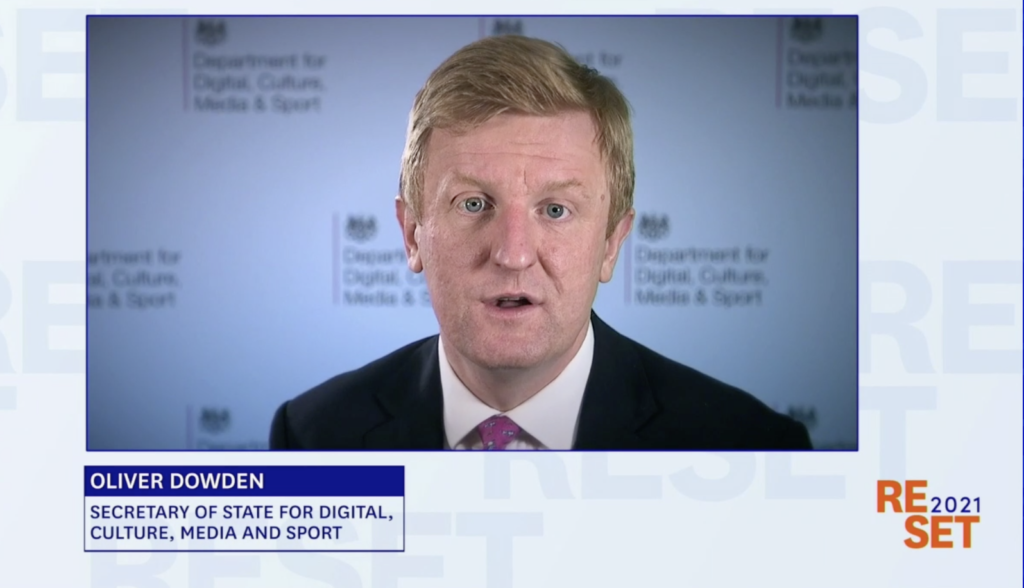Government minister Oliver Dowden delivered a carrot and stick message to the advertising industry in his keynote speech at the virtual Reset2021 conference.
Dowden, Secretary of State for Digital, Culture, Media and Sport, paid tribute to how the ad industry had responded to the Coronavirus pandemic and pledged to support it to build back better post-pandemic.
He also outlined stringent new rules around junk food marketing online and on-air and talked of the need to reform the “fundamental imbalance” in the digital ecosystem.
His was the first session at the Reset event – the first time the Advertising Association, the IPA and ISBA have joined forces to host their annual conferences.
Rebuilding a creative giant for a post-Covid world
Dowden said: “It’s great to see the sector coming together in this way to talk about how we can rebuild and recover from Coronavirus.”
He said that advertising, pre the pandemic, was one of the UK’s creative giants, contributing £17bn pounds to the economy in 2019 and employing more than 190,000 nationally. Beyond the economics, he lauded its creative capital, noting how ads such as the annual John Lewis Christmas spot have become cultural events “in their own right”.
“Too many people forget the raw power of our sector in terms of the impact it has on every part of our lives. A well-crafted advert or campaign can influence the way we look at what we eat and drink, how we vote – and the way we behave during a global pandemic.
“Never have people been more interested in the power of messaging to change people’s behaviour, and never has that task be more urgent than in the past year,” he said, adding that “a few simple phrases” such as the government’s own ‘Stay Home, Protect the NHS, Save Lives’ slogan “may have been the difference that protected 1000s of people from the coronavirus”.
Dowden also thanked the industry for donating media space for free, at a time when the sector was itself under incredible strain, with ad spending dramatically falling year on year.
The “immense” power of advertising – for better and for worse
“The advertising industry harnesses an immense power and has directed it against coronavirus for the national good,” he added.
However, the pandemic had also sharpened government ministers’ minds in the battle to combat obesity – and it was now considering stringent new rules around the promotion of food high in fat, sugar or salt (HFSS) – despite knowing this would be a further financial knock for the industry.
“One of our most urgent tasks as a government is reducing obesity and getting the nation strong and fit for the future I know that this is a major priority for the prime minister who is on his own personal health mission, and, in turn, it’s his priority for the entire nation, and the central part of this is making sure that the information and media children are exposed to,” he continued, urging ads to promote healthy, balanced diets.
“With that in mind, we have announced our intention to ban adverts and products that are high in fat, sugar and salt from being shown on TV before 9 pm. We’re also committed to addressing this online. Crucially in parallel with broadcast, and currently considering the introduction of a total HFSS advertising restriction on the internet.
“This decision was taken against this specific, and as I hope you’ll appreciate the exceptional backdrop of a national health emergency. I believe it’s the right one given all that COVID has taught us.”
He said he “genuinely appreciated” the significant impact such a move would have “at what is already a very difficult time for the sector”. He promised to listen to the industry and to fight advertising’s corner ensuring a “strong and clear voice in government”.
Tackling the “fundamental imbalance” in digital advertising
He spoke of the wider structural changes within the industry at large but particularly online. “The internet has been a huge force for good in all of our lives, but it’s also disrupted almost every single sector.”
That had led to benefits, but also brought a number of challenges, he said. “There are growing concerns about brand safety about transparency and accountability around content standards, and harm.
“Most of all the rise of online advertising has created a fundamental imbalance between publishers, advertisers, and the online platforms, upon which they increasingly rely. It’s time to even that playing field.”
He outlined measures announced late last year, including the establishment of a new pro-competition regime for digital markets that would enforce a new code of conduct for tech giants, talked of delivering on outcomes of the Cairncross review and gave an update on the call for evidence on the extent of how consumers are exposed to harmful or misleading advertising online. Further updates on this would be released later this year. “I want to see advertising that is fair, accountable and ethical,” he said.
Critically, though, the advertising industry at large would help Britain get moving again as and when the threat of the pandemic waned. “You almost more than any other sector can turbocharge our recovery and the government will be here to support you through that post COVID transition,” he said.
Advertising’s role in getting Britain moving again
“A strong market economy needs advertisers and your immense creativity to help consumers make informed choices.”
The government was itself planning a “huge” tourism campaign to “broadcast to the world that Britain is back open for business”. This would centre around 2022 and showstopper events such as the Platinum Jubilee, Commonwealth Games and Festival UK 2022 “all of which represent huge opportunities for the industry”.
“Most of all, though, this pandemic represents a genuine opportunity to stop to take a moment to think about how we can do things differently,” he concluded. “As we exit this pandemic we have the chance to lead a stronger, more equitable, more resilient advertising sector.”









